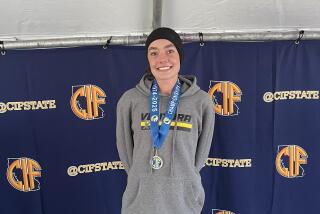Their Day to Rein : Special Olympians Ride for Pride, Accomplishment in State Contest
- Share via
VENTURA — After guiding his 1,500-pound steed, Curly, over a cluster of jumps with all the grace of a prima ballerina, Special Olympian Martin Hill watched his closest competition.
Although the 34-year-old Newbury Park resident, dressed in snug riding pants, double-breasted jacket and black velvet helmet, pined for another shiny gold medal, he felt bad when his competitor missed the final jump.
“She really did well,” Hill commented to his teammates. “Just a little too fast, that’s all.”
Hill was one of more than 70 developmentally disabled individuals who competed in the third annual Southern California Special Olympics State Equestrian Championship over the weekend at the County Fairgrounds at Ventura’s Seaside Park.
Sponsored by the Special Olympics, the city of Ventura and the Ventura County Saddle Club, the event attracted athletes from across Southern California for a weekend of fun, camaraderie, accomplishment and, least importantly, competition.
“Being up on a horse, you see the world differently, and these athletes don’t often get to see things in another way because of society’s labels,” said Liz Ashe, who serves as coach for the Tri-Valley Special Olympics Riding Program. “Here, they get to have a hobby; they get to be an individual and get to belong to a community they can relate to.”
Although the competition awards gold, silver and bronze medals as well as flowery ribbons, organizers said the most important aspect is that it fosters a profound sense of pride and accomplishment.
“It’s a huge confidence and self-esteem builder,” said Bob Martin, director of Ventura County’s Special Olympics. “Learning to ride a horse, which is a lot bigger than you, is really hard and when they do it--and if they win a medal--it’s a very proud moment.”
However, while giving the competitors a sense of independence that is sometimes denied them in mainstream society, the competition and the hours of training that precede it serve another, more practical and therapeutic purpose.
“A lot of these people have problems with their motor skills and coordination, and learning to be a competitive rider helps them work on those skills,” Martin said. “There are also some who have behavioral problems, so the socialization aspect between coaches, teammates and horses is really important.”
The equestrian competition also attracted a number of volunteers, like Sally Gaytan of Ontario. “I love their enthusiasm,” said the 40-year-old customer service representative from Southern California Edison. “You can’t help but feel good when you’re around them.”
The competition, which ran through Sunday, featured six events ranging from showmanship, which tests a rider’s skill at mastering a horse, to the exhilarating and sometimes dangerous jumping competition.
“That’s my favorite because it’s the most exciting,” Hill said, mugging for photos after capturing first place. “I still get a little scared before I go, though, so I’m happy I got through it.”
Hill already won two events Saturday and proudly wore one of the medals around his neck. The other he gave to his beaming mother, Berlyn Powell.
“Oh Martin, that was so great,” she said as she gathered her son into her arms. “I am so proud of you.”
More to Read
Go beyond the scoreboard
Get the latest on L.A.'s teams in the daily Sports Report newsletter.
You may occasionally receive promotional content from the Los Angeles Times.






